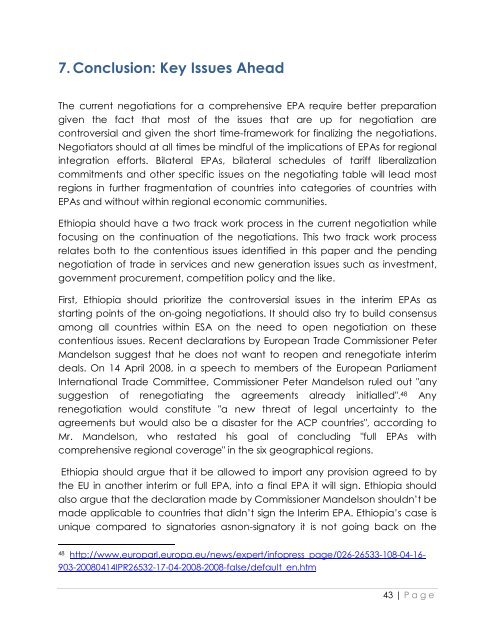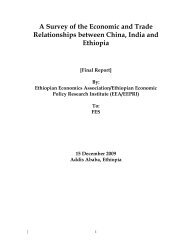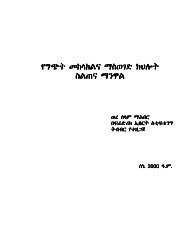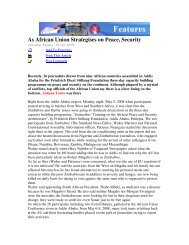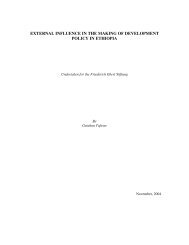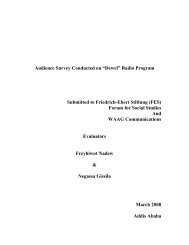Ethiopia and EPA Negotiation 2008 - FES Ethiopia
Ethiopia and EPA Negotiation 2008 - FES Ethiopia
Ethiopia and EPA Negotiation 2008 - FES Ethiopia
Create successful ePaper yourself
Turn your PDF publications into a flip-book with our unique Google optimized e-Paper software.
7. Conclusion: Key Issues Ahead<br />
The current negotiations for a comprehensive <strong>EPA</strong> require better preparation<br />
given the fact that most of the issues that are up for negotiation are<br />
controversial <strong>and</strong> given the short time-framework for finalizing the negotiations.<br />
Negotiators should at all times be mindful of the implications of <strong>EPA</strong>s for regional<br />
integration efforts. Bilateral <strong>EPA</strong>s, bilateral schedules of tariff liberalization<br />
commitments <strong>and</strong> other specific issues on the negotiating table will lead most<br />
regions in further fragmentation of countries into categories of countries with<br />
<strong>EPA</strong>s <strong>and</strong> without within regional economic communities.<br />
<strong>Ethiopia</strong> should have a two track work process in the current negotiation while<br />
focusing on the continuation of the negotiations. This two track work process<br />
relates both to the contentious issues identified in this paper <strong>and</strong> the pending<br />
negotiation of trade in services <strong>and</strong> new generation issues such as investment,<br />
government procurement, competition policy <strong>and</strong> the like.<br />
First, <strong>Ethiopia</strong> should prioritize the controversial issues in the interim <strong>EPA</strong>s as<br />
starting points of the on-going negotiations. It should also try to build consensus<br />
among all countries within ESA on the need to open negotiation on these<br />
contentious issues. Recent declarations by European Trade Commissioner Peter<br />
M<strong>and</strong>elson suggest that he does not want to reopen <strong>and</strong> renegotiate interim<br />
deals. On 14 April <strong>2008</strong>, in a speech to members of the European Parliament<br />
International Trade Committee, Commissioner Peter M<strong>and</strong>elson ruled out "any<br />
suggestion of renegotiating the agreements already initialled". 48 Any<br />
renegotiation would constitute "a new threat of legal uncertainty to the<br />
agreements but would also be a disaster for the ACP countries", according to<br />
Mr. M<strong>and</strong>elson, who restated his goal of concluding "full <strong>EPA</strong>s with<br />
comprehensive regional coverage" in the six geographical regions.<br />
<strong>Ethiopia</strong> should argue that it be allowed to import any provision agreed to by<br />
the EU in another interim or full <strong>EPA</strong>, into a final <strong>EPA</strong> it will sign. <strong>Ethiopia</strong> should<br />
also argue that the declaration made by Commissioner M<strong>and</strong>elson shouldn’t be<br />
made applicable to countries that didn’t sign the Interim <strong>EPA</strong>. <strong>Ethiopia</strong>’s case is<br />
unique compared to signatories asnon-signatory it is not going back on the<br />
48<br />
http://www.europarl.europa.eu/news/expert/infopress_page/026-26533-108-04-16-<br />
903-<strong>2008</strong>0414IPR26532-17-04-<strong>2008</strong>-<strong>2008</strong>-false/default_en.htm<br />
43 | P a g e


